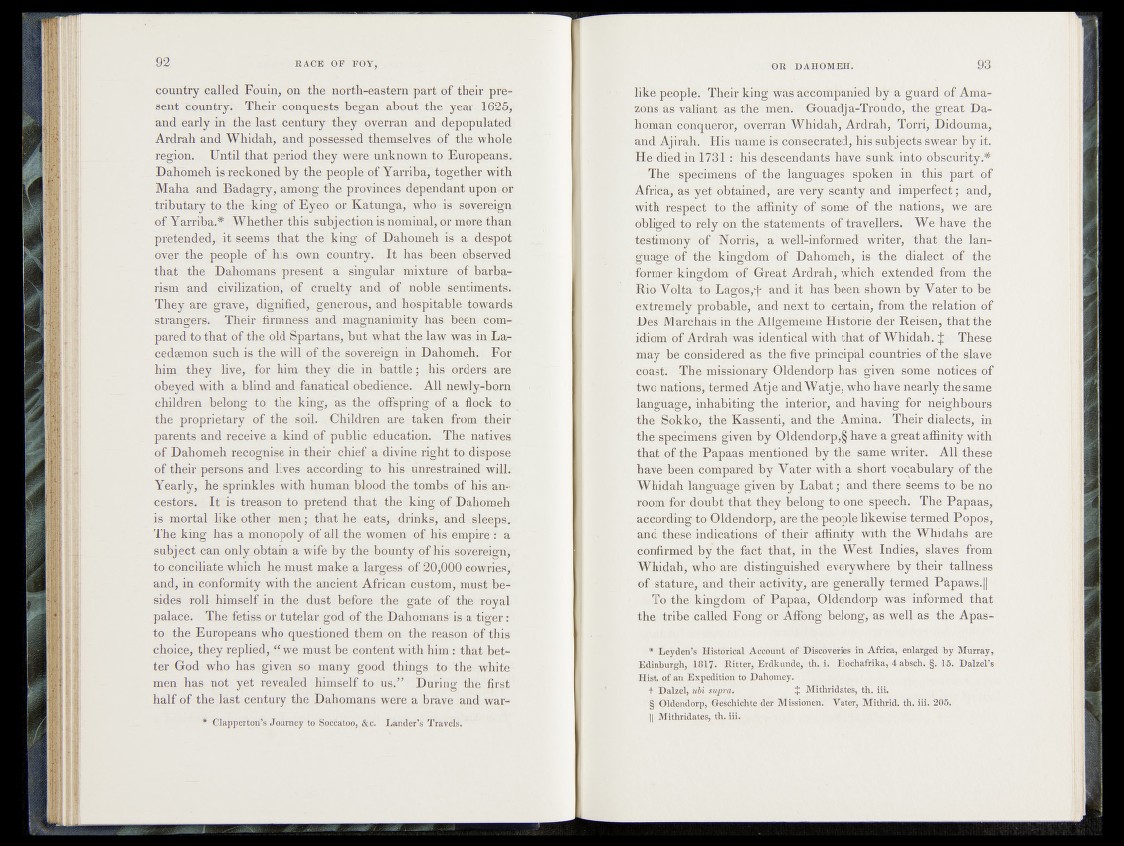
country called Fouin, on the north-eastern part of their present
country. Their conquests began about the year 1625,>
and early in the last century they overran and depopulated
Ardrah and Whidah, and possessed themselves of the whole
region. Until that period they were unknown to Europeans.
Dahomeh is reckoned by the people of Yarriba, together with
Maha and Badagry, among the provinces dependant upon or
tributary to the king of Eyeo or Katunga, who ie: sovereign
of Yarriba.* Whether this subj ection is nominal, or more than
pretended, it seems that the king of Dahomeh is a .despot
over the people of his own country. It has been observed
that the Dahomans present a singular mixture of barbarism
and civilization, of cruelty and of noble sentiments.
They are grave, dignified, generous, and hospitable towards
strangers. Their firmness and magnanimity has been compared
to that of the old Spartans, but what the law was in Lacedaemon
such is the will of the sovereign in Dahomeh. For
him they live, for him they die in battle; his orders are
obeyed with a blind and fanatical obedience. All newly-born
children belong to the king, as the offspring of a flock to
the proprietary of the soil. Children are taken from their
parents and receive a kind of public education. The natives;
of Dahomeh recognise in their chief a divine right to dispose
of their persons and lives according to his unrestrained will.
Yearly, he sprinkles with human blood the tombs of his ancestors.
It is treason to pretend that the .king of Dahomeh
is mortal like other men; that he eats, drinks, and ^sleeps.
The king has a monopoly of all the women of his empire : a
subject can only_obtain a wife by the bounty of his sovereign,
to conciliate which he must make a largess of 20,000 cowries,
and, in conformity with the ancient African custom, must besides
roll himself in the dust before the gate of the royal
palace. The fetiss or tutelar god of the Dahomans is a tiger:
to the Europeans who questioned them on the reason bf this
choice, they replied, “ we must be content with him: that better
God who has given so many good things to the white
men has not yet revealed himself to Us.” During the first
half of the .last century the Dahomans were a brave and war-
* Clapperton’s Journey to Soccatoo, &c. Lander’s Travels.
liké pëbpïe. Their kjh^f^ts^bc'ompanied byaguard of Ama-
zonk.as valiant -as1 thé$ merit ;^Gouadj a-Troudo, the great Da-
homan ebkïffierör, Whidah, Ardrah, Torri, Didouma,
ahd Ajirah. His his subjects sweanfb^ it.
He»'died in%7^F:'thib4i%^eh'd!an^bave sunkrintd'obscurity.*
The specimens > pÉ the' tèkg&ia|fés spoken vdrtH this part of
Africa, as yp'f öbtamedy ^re^vèft^'ScantWnhd^jmperfec^^end,
with* respect'to the'1 affinity of .pèmh' of the'nations, we are
obliged to rely on the ^StatëmeMè’ :of travellers. Webave the
testimony of "Norris, 'a^tveUrinforme^ -writer/^hat^t-Kê language
of the"kingdom of is< ^daalëet >of the
former kingddir/ of Great-Ardrah^ which extended.frora the
Rio YoRh to'-Lago's/f* and it has beerè shown by Vater to be
extremely probable, and next to- certain, from the relation ©f
Des Marchais in the Allgemeine Historie der -Reisen, that the
idüom of Ardrah was identical with that of Whidah. J These
may be Considered as the-five principal countries of the sla ve
coast. -The missionary Oldendorp has givedf sonras notices of
two nations, termed Atje and Watje* who havé nearly the safme
language, inhabiting the interior, and having for neighbours
the Sokkp, the Kassenti, and the Amina. Their dialects, in
the specimens given by Oldendorp,§ haven great affinity with
that of the Papaas mentioned by the same writer. All these
have been compared by Vater with a short vocabulary of the
Whidah language given by Labat; and there seems to be no
room for doubt that they belong to one speech.? The Papaas,
according to Oldendorp, are the people likewise termed Popos,
and these indications bf their affinity with the Whidahs are
confirmed by the fact that, in the West Indies^1 slaves from
Whidah, who are distinguished everywhere by their tallness
of stature, and their activity, are generally termed Papaws.jf ’
To the kingdom of Papaa, Oldendorp was informed that
the tribe called Fong or Affong belong, as well as the Apas-
* Leyden’s Historical Account of Discoveries in Africa, enlarged by Murray,
Edinburgh, 1817. Ritter, Erdkunde,; th. i. Hochafrika, 4 absch. §.15. Dalzel’s
Hist, of an Expedition to Dahomey.
t Dalzel, uli supra. $ Mithridates, th. iif.
§ Oldendorp, Geschichte der Missiöftèib ‘"Vater, Mithrid. ffb
« || Mithridates, th. iii. .